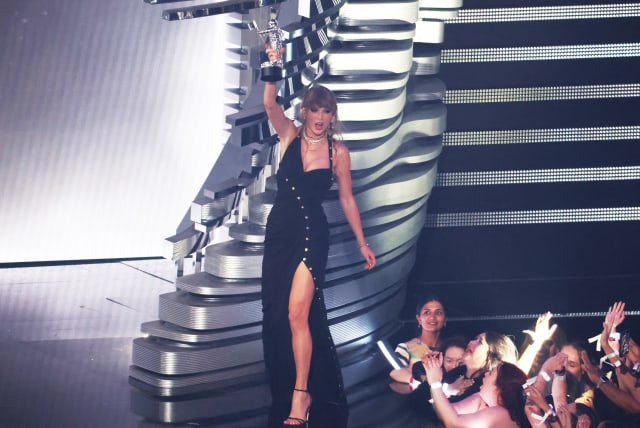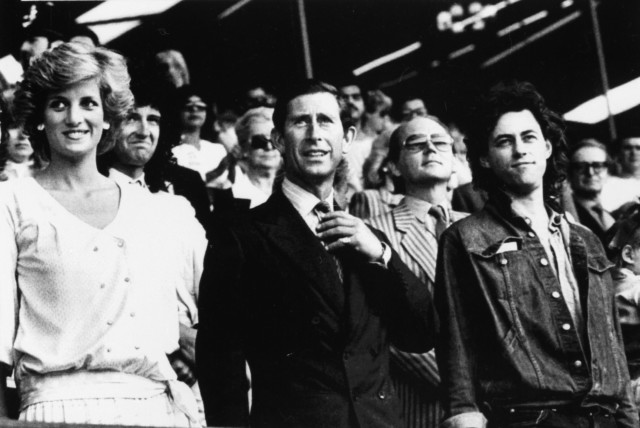How Taylor Swift and other musicians help charitable causes

The period between Rosh Hashanah and Yom Kippur is a good time to look at the various charitable causes musicians have been helping for decades.
Since rock music started more than half a century ago, musicians have continually found ways to creatively give money to those people who need it the most. Just a little over a month ago at the end of the US leg of Taylor Swift’s Eras Tour, all the drivers were called to a surprise meeting.
These are the guys who for months had been driving through the night from city to city in trucks filled with the stages plus sound and light equipment. Taylor’s father, Scott, led the meeting and explained that his daughter felt that it was only right that everybody involved in the tour should receive a bonus. This was not unusual being that the drivers expected to get somewhere between $1,000 to $5,000 each. As they sat there listening, some of them glanced down at the letter that listed the amount.
One saw it as $1,000 while another one understood that it was $10,000. Finally, there was someone who did correctly read the amount as $100,000 and said, “Well this has to be some kind of a joke.”
It wasn’t.
Taylor Swift gave each of her 50 drivers enough money for a down payment on a house or college tuition for a child. This was a cash gift that could make a significant change in their lives.
And to top it all off, each envelope included a handwritten note from Taylor herself thanking each and every driver. In the end it turned out that she gave bonuses to everyone involved in her tour including dancers, riggers, sound technicians, catering, video, audio and lighting. The total amount given away came to $55 million.
Rosh Hashanah, Yom Kippur, music, and charity
In this period between Rosh Hashanah and Yom Kippur, we recall the prayer that includes the words, “And repentance and prayer and charity will annul the evil decree.”
When it comes to giving charity, rock musicians have been donating to various charitable causes for decades. As a baby-boomer born in the early 1950s, my first rock group was The Beatles. Not many people know that the group concluded its first tour of the United States in the summer of 1964 in New York with a concert to benefit United Cerebral Palsy and Retarded Infants Services.
This sold-out show, hosted by Ed Sullivan himself, took place at the Paramount Theater, where tickets were priced between $1-$5 plus a donation. After The Beatles broke up in 1970 and began their solo careers, each of them pursued various charitable causes.
George Harrison in the summer of 1971 organized the Concert for Bangladesh to fund relief for refugees from East Pakistan. Guests included fellow ex-Beatle Ringo Starr, Bob Dylan, Eric Clapton, Ravi Shankar, Leon Russell, Billy Preston, plus many others. (I had the privilege of being at the evening show, which until today is still the best concert I’ve ever attended.) Over the years, revenue from the concerts themselves plus profits from the film and record probably have come to about $45m.
A little over a year later came John Lennon’s One to One Concert for Willowbrook. The show, organized by Geraldo Rivera, was a benefit for the Willowbrook State School for Retarded Children in New York. The ex-Beatle and his wife, Yoko Ono, were backed by Elephant’s Memory. Other artists who appeared included Stevie Wonder, Roberta Flack, Melanie, and Sha Na Na.
At the end of the ’70s, Paul McCartney organized the Concerts for the People of Kampuchea in London to raise money for the victims of war-torn Cambodia. Other featured artists included McCartney’s second band, Wings, The Who, Queen, Elvis Costello plus others.
Last but not least we have Ringo Starr’s Lotus Foundation, which he runs with his wife ,Barbara Bach. They fund, support, participate in, and promote charitable projects aimed at advancing social welfare in diverse areas. The monies raised have come to millions of dollars from the sale of The Beatles drummer’s personal memorabilia collection, handmade artwork, and books.
NO ARTICLE about rock charities would be complete without mentioning Live Aid in 1985 with twin concerts held in the US (Philadelphia) and the UK (London). This mega concert, organized by Bob Geldof, could never have happened without the launch of Band Aid’s “Do they Know It’s Christmas?” the previous December.
This recording, set up by Geldof and Midge Ure, which would eventually bring in more than $200m., set the stage for the US single,“We are the World” by the United Support of Artists for Africa. Profits from this record came to about $50m. to help feed the starving people of famine torn Ethiopia. It’s estimated that money collected for these two simultaneous live shows came to about $150m.
While on the Live Aid stage in Philadelphia, Bob Dylan said in the middle of his performance, “I hope that some of the money... maybe they can just take a little bit of it, maybe... one or two million, maybe... and use it, say to pay the mortgages on some of the farms, and the farmers here who owe the banks.” And so “Farm Aid” was born.
A few months later the first show that they ever produced was organized by Willie Nelson, Neil Young, and John Mellencamp. The concerts have continued to be staged almost annually to this day.
In 1986, Neil Young with his wife Pegi Young, launched The Bridge School Benefit. It was held every year until 2016 when the Youngs got divorced. The funds collected assisted children with severe physical impairments and complex communication skills.
In the year following the Millennium, the world was shocked by the attack on the Twin Towers in New York on September 11, 2001. Again, it was rock musicians who came to the fore to help provide aid to the many victims of this tragic event.
First came “America: A Tribute to Heroes” just 10 days after the attack. Done in the style of a telethon, it was broadcast by the four major television networks plus all the cable networks. The monies raised went to victims and their families, particularly New York City firefighters and New York City police officers.
Over $200m. was raised and given to the United Way September 11 Telethon Fund. Participants in the program that evening included Bruce Springsteen, Stevie Wonder, Paul Simon, Billy Joel, Neil Young, and Willie Nelson.
Just a month later came the live Concert for New York City. Organized by Paul McCartney, the show at Madison Square Garden was to honor first responders from the New York City Fire Department and the New York City Police Department. The five-and-a-half-hour concert had not only performances from musicians but also actors, comedians, and even athletes. In that one evening, $35m. was raised for the victims.
It should be noted that there are two charitable foundations based on the participation of music personalities. The first is the TJ Martell Foundation established by Tony Martell, an executive at Columbia Records, in memory of his 21-year-old son who died of leukemia. The foundation is a leader in funding innovative leukemia, cancer, and AIDS research and has raised over $285m.
The other organization that needs to be mentioned is MusiCares, which provides funds for fellow musicians who might be experiencing a personal, financial, or medical crisis. With their annual “Person of the Year” benefit concerts, they have honored some of the greatest musical artists including Paul McCartney, Carole King, Barbra Streisand, Bruce Springsteen, Bob Dylan, Dolly Parton, Neil Diamond, Paul Simon, and Stevie Wonder
Here’s the story of a more personal gift of charity given by a major rock artist. It’s about guitar great Eric Clapton who with his group, Derek & the Dominoes, produced the classic rock album Layla more than 50 years ago. About a half dozen of the songs were written with Bobby Whitlock, one of the Dominoes.
Whitlock fell on hard times in 2001 because of drug addiction and found the need to sell his composer rights to Warner/Chappell. When Clapton was putting together the 40th anniversary edition of the Layla album, he heard about what had happened to Whitlock’s publishing rights. The guitar virtuoso thought that it was unfair that his co-composer wouldn’t benefit from the re-release. Clapton purchased the rights from Warner/Chappell and gave them back to Whitlock, who now is drug-free and has a steady income for the rest of his life.
Remember when you were listening to music in your teen years and your parents walked into your room screaming, “You call that music.” To them, rock and roll was just about sex and drugs. They might have thought differently had they known about the generosity of some of these rock stars. May we all find ways to give to others so that all evil decrees against us will be annulled.
The writer is a musician and educator living in Jerusalem with his wife, children, and grandchildren.
Jerusalem Post Store
`; document.getElementById("linkPremium").innerHTML = cont; var divWithLink = document.getElementById("premium-link"); if (divWithLink !== null && divWithLink !== 'undefined') { divWithLink.style.border = "solid 1px #cb0f3e"; divWithLink.style.textAlign = "center"; divWithLink.style.marginBottom = "15px"; divWithLink.style.marginTop = "15px"; divWithLink.style.width = "100%"; divWithLink.style.backgroundColor = "#122952"; divWithLink.style.color = "#ffffff"; divWithLink.style.lineHeight = "1.5"; } } (function (v, i) { });

